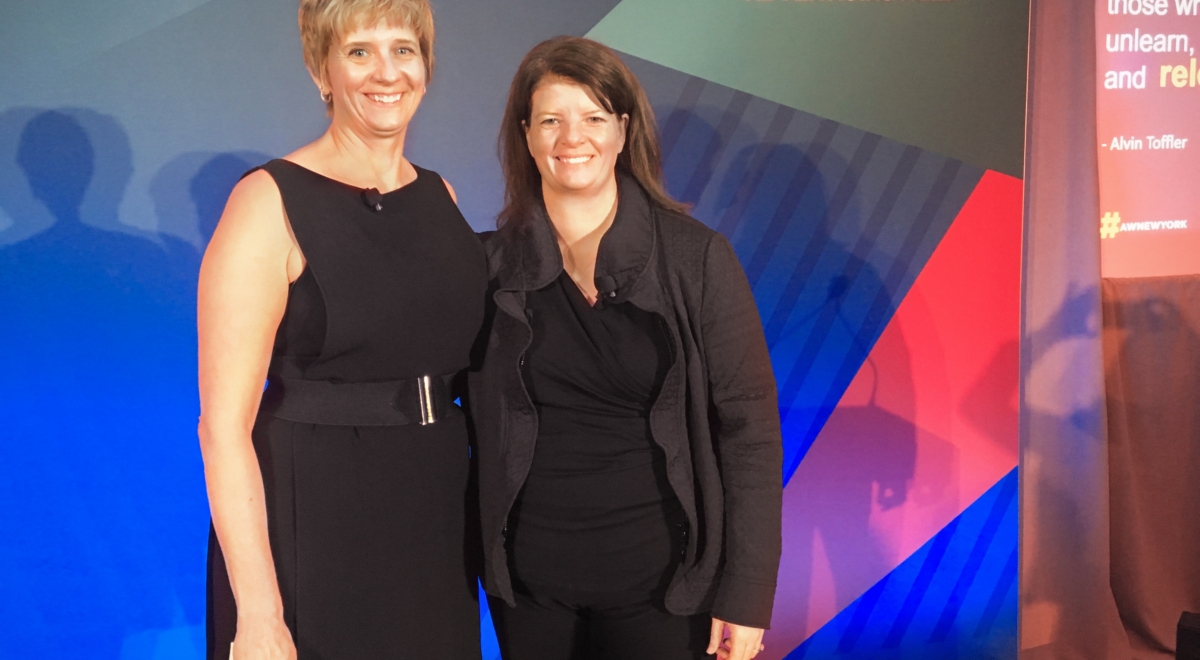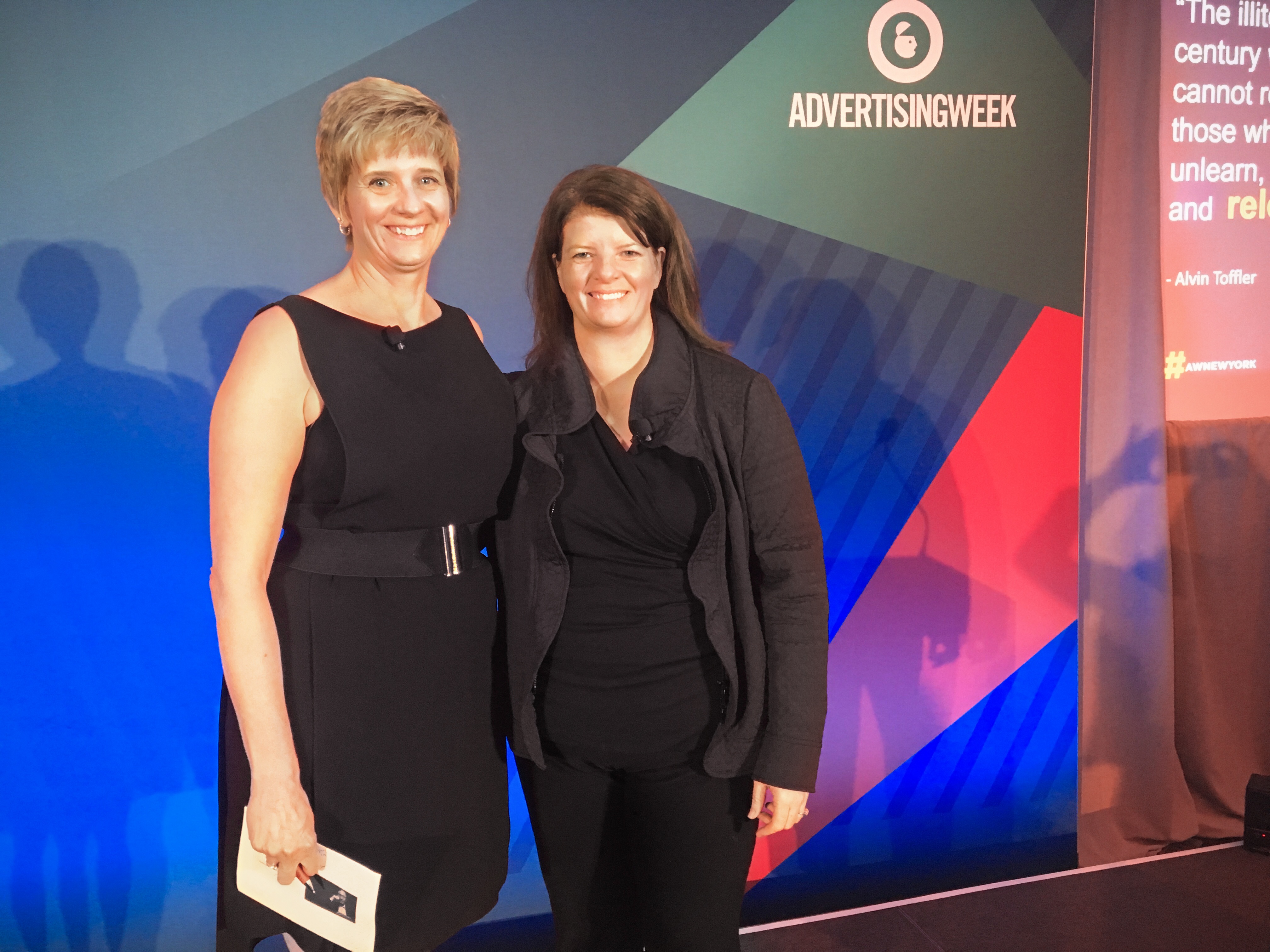Algorithms Don’t Understand Love – Advertising Week 2016 Presentation Highlights

The future is exciting. For any organization to grasp its potential and their role in making a positive impact on humanity at large, they must connect as many dots as possible in and across fast-paced, hyperconnected marketplaces. Across every industry, those correlations offer the best chance to create, pursue, and assess our future with openness and optimism. They help organizations and industries to see things they might otherwise miss, helping them to position their business to thrive in an uncertain future.
___________
 Liz Ross is the CEO of Periscope, an independent, full-spectrum impact agency. She invited me to join her on the Bing stage during 2016 New York Advertising Week to take a look at look at how (and why) professionals in the marketing field must learn, unlearn, relearn if the industry is to keep up with rapidly changing global realities.
Liz Ross is the CEO of Periscope, an independent, full-spectrum impact agency. She invited me to join her on the Bing stage during 2016 New York Advertising Week to take a look at look at how (and why) professionals in the marketing field must learn, unlearn, relearn if the industry is to keep up with rapidly changing global realities.
Liz is a passionate industry insider. It was an honor to share the stage with her at this premier event for marketing, brand, advertising, and technology professionals. I was thrilled to have a chance to get a firsthand view of the changes, opportunities and disruptions characterizing the future of advertising and marketing – and to contribute an outsider’s perspective of larger changes that could spur new thinking.
Liz and I collaborated to highlight six core changes the industry must make to stay relevant and to make an impact. At the heart of our presentation was the message that professionals in the field must be able to learn, unlearn, and relearn. This is a tenet that I know applies to virtually every industry, both public and private, but it was a somewhat unique message for this audience. Specifically, we discussed the fact that the marketing industry has reached a point at which it’s vital to unlearn its reliance on data and relearn that amidst all the programmatic, automation and data collection, human connections are still the most important factor in understanding what people want and desire.
Data Isn’t Everything
It’s impossible to understand data without understanding the human. Real, productive disruption prioritizes a human-centered way of thinking. Unfortunately, the marketing industry (they’re not alone in this) has defaulted to a growing reliance on technology, using data and algorithms to determine messaging rather than going directly to the audiences to hear what they’re experiencing and what they really want and need most. Companies distracted by the flash of innovation have put their brands at risk by losing sight of what makes them important for humanity and culturally relevant.
“We need to reconnect to what it means to be human, especially in a fast changing world. Our data is not nearly as predictive as we would like and can miss the mark.”
– Liz Ross
The intricacies and subtleties of human behavior are not as predictable from the data we collect as we would think. The data and algorithms currently used to understand human behavior for marketing and advertising only capture at best 30% of what people do and experience – only their behavior online. The other 70% comes from observing humans when they aren’t online. When they’re engaged in the real world, with others, alone, doing mundane things or laying a foundation for the future. Those are the patterns of life that make brands valuable in the present and future tense. By looking only at marketing data, we lose a grasp on how to move into the future with the audiences we value.
Tipping the Balance of Power
The balance of power is shifting to consumers. As technology connects us, we each gain a stronger voice. And with it, we gain power. For companies, government agencies, and even societies, this power shift to the consumer is blurring the boundaries that once provided an important level of message control. People are more aware and knowledgeable, more likely to pursue and share information, and much more demanding when it comes to corporate or governmental transparency.
In addition to demanding proof of authenticity, consumers also want personalization. This is a real problem for those companies that have fooled themselves into thinking that what they offer is for everyone. Brands can no longer be reticent to segment and prioritize their message for the people who care, ask, use, and believe most if they are going to build productive, valuable, lasting relationships.
A Big Change for Big Data
The business model of “big data” is changing. Simultaneously, we’re experiencing more identity theft than ever, increased algorithm capabilities, and expanding capacity to gather and parse big data. This confluence of growing risk and volume is prompting new discussions and doubts about the reliability and trustworthiness of digital intelligence.
As a result, individuals are gaining more ownership of their own digital footprint. On the one hand, organizations are trying to mitigate legal risks. On the other, they’re trying to provide evidence of transparency and trustworthiness. It’s forcing brands to reconsider how to use their channels to have a dialogue. And customers may opt to continue to offer their digital identity to brands they know, admire, and trust – though likely only at the promise of a secure and more personalized experience.
This is another reason why brands absolutely have to prioritize authentic, human-centered engagement. Taking a relational approach to customer engagement is the best way organizations can show they care about and respect each valuable member of the key audience. Ideally, the customer will then do their part in the exchange by offering their valuable data.
Artificial Intelligence (AI) Makes Humans More Important
There’s no question that the widespread uptake of rapidly developing cognitive technology is creating a new economy. But these new innovations in AI, robotics, cognitive predictive intelligence, machine learning, and embedded or prosthetics are making humans more important – not less.
While there is value removing human emotion and bias from some decision-making processes, we can’t discount the incredible impact of trying to understand and act on real human behavior. In the consumer marketplace, AI prompts behavior changes that reshape markets (e.g., fitness monitors strengthen our commitment to walk more and eat better, which impacts things like urban planning around sidewalks, larger produce availability in grocery strategies, and new ‘athleisure’ apparel trends). Inside organizations, AI is generating more actual, relevant insights that improve our ability to learn, share, innovate, do business, and build wealth. Ultimately, AI is enabling higher level thinking, faster performance, greater accountability, and more freedom for people to focus on higher value, more relational, more fulfilling work.
Progress is Fun!
At the end of the day, Liz and I were delighted to hear from people in our live and streaming audiences that our imperative for the marketing industry to learn, unlearn, and relearn was well received. This was a fun, exciting chance for me not only to contribute, but to discover as well.
My main observations from Advertising Week 2016 include:
- This industry is populated by an exciting mix of technologists and creative minds
- People are truly interested and invested in the changes happening
- There is a sense that this industry is on the brink of (another) era of change
- Marketers need to embrace this impending transformation to stay successful and relevant
- Many brands are not yet certain how to bridge the gap from current state to Future Proof®
The message that Liz and I shared was intended to address all of these observations and help the industry become more strategic and future-focused. The takeaways we offered to them were to:
- Make sure you understand your purpose
- Hone in on who wants and needs you most
- Prioritize actual human relationships with those individuals
- Use technology as a tool, not an end
- Build a culture in which teams can learn, unlearn, and relearn constantly
Bridging the gap between desire and results requires the right tools. More importantly, though, it requires the clarity to know how to use your tools to connect, learn, engage in diversity, pursue curiosity, and keep humanity at the center of your focus. Doing that is how the organizations of today will shift from reactive to being proactive, and how we all will engage more deeply with one another for a better future.
Check out Deb and Liz at during 2016 New York Advertising Week here:
{{cta(‘d31f523a-f5a0-4ead-81de-8f4bf7280f60’)}}
- Categories
- Futures and Foresight


 About the Authors
About the Authors